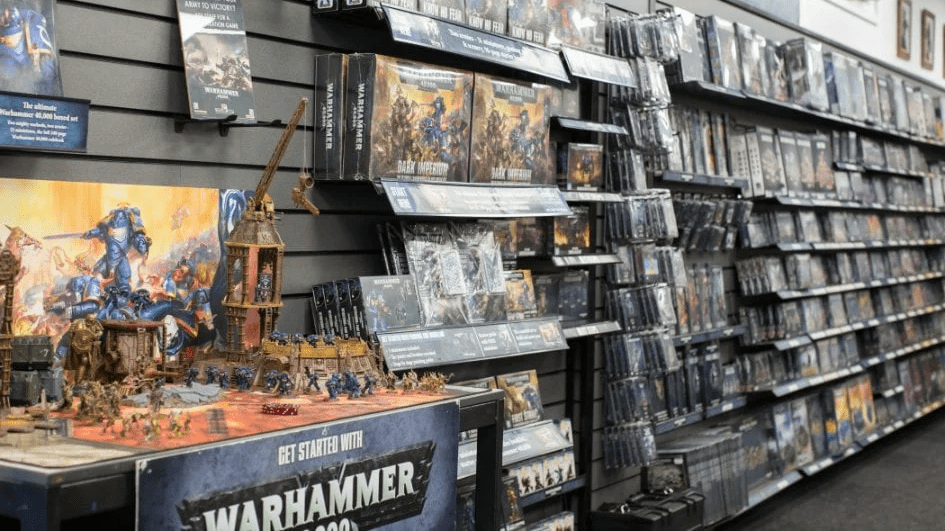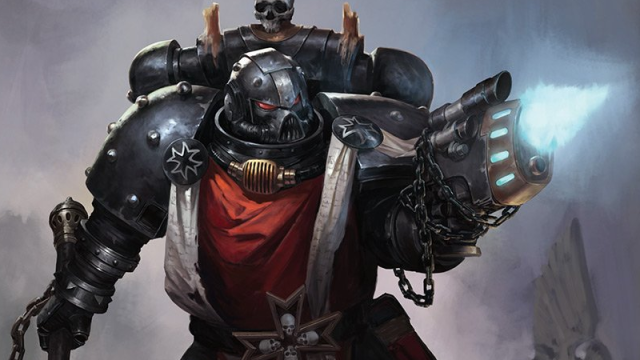Games Workshop has had a long time to reckon with just how explicit the “Grimdark” satire of its tabletop wargaming universe is. It portrays a fascist, zealous imperial regime as heroic — in a universe of demonic horrors and alien invasion — to players who might find themselves fond of such ideals in real life. But the company has recently been forced to take stock of that satire in the wake of Nazi imagery being worn to a recent tournament.
Earlier this month, the GT Talavera Warhammer tournament — a major competitive event in the Spanish wargaming community calendar, but not one officially organised by Games Workshop — found itself mired in controversy when an entrant allegedly under the pseudonym “Pintor Austriaco” (Spanish for “Austrian Painter,” a thinly veiled reference to Adolf Hitler) participated in games while wearing clothing depicting Nazi imagery. Organisers of GT Talavera — the wargaming club “El Cobrador del Waaagh” (“The Waaagh Collector,” named for the battle cry of 40K’s space orks) — allegedly ignored player complaints to remove the neo-Nazi from play, even purportedly awarding them wins when other competitors withdrew rather than play against someone unironically wearing fascist imagery.
After the controversy gained ground in the English-language Warhammer community in the last few weeks, El Cobrador del Waaagh provided a statement to the tabletop gaming site Spikey Bits, declaring its stance against fascism in all forms, but defending its decision to allow a fascist to keep participating in their tournament in order to avoid “committing a crime of ideological discrimination.” The Spanish-language community’s statement, presented to Spiky Bits in English, reads in part:
During the second day of the tournament one of the participants showed up wearing clothes with Nazi symbols, one of his opponents refused to play against him and demanded that we expel him from the tournament. Two members of the organisation (one of them a lawyer by profession) met alone with the player in Nazi clothing, exposing him the situation and our dissatisfaction with him showing this symbolism in the tournament. This individual replied that he had no problem in playing against anyone and that he had behaved correctly throughout the tournament, but if we wanted to expel him he would call the police himself.
At this point we want to emphasise that in Spain it is not a crime to display Nazi symbols as long as it is not accompanied by criminal conduct (and I want to emphasise that we do not believe that the law is fair or correct, but that’s how it is written), instead if the organisation expels to this person for his deplorable ideas (Nazism), it is the organisation that is committing a crime of ideological discrimination and it could perfectly denounce us and would have the law on its side. At that moment we find ourselves tied hand and foot.
The statement goes on to state that El Cobrador del Waaagh will modify rules for future tournaments to grant organisers the power to expel players from tournaments without fear of legal reprisal — although the group did not clarify what steps it would take to do so. But in a rare move, the controversy has seemingly led to Games Workshop releasing its own wider public statement about members of hate groups and their relationship to the world of Warhammer 40,000.
“We believe in and support a community united by shared values of mutual kindness and respect. Our fantasy settings are grim and dark, but that is not a reflection of who we are or how we feel the real world should be. We will never accept nor condone any form of prejudice, hatred, or abuse in our company, or in the Warhammer hobby,” a lengthy blog post titled “The Imperium Is Driven By Hate. Warhammer Is Not.” on the official Warhammer Community website reads, re-iterating commentary made by the company last year, at the height of summer 2020’s protests in support of the Black Lives Matter movement.
— WarhammerCommunity (@WarComTeam) June 4, 2020
“If you come to a Games Workshop event or store and behave to the contrary, including wearing the symbols of real-world hate groups, you will be asked to leave,” the piece continues. “We won’t let you participate. We don’t want your money. We don’t want you in the Warhammer community.” Although the post does not name GT Talavera explicitly, it calls on the organisers of several officially supported Warhammer tournaments — AdeptiCon, the Las Vegas Open, and Blood & Glory — to join Games Workshop in banning players for wearing hateful imagery at events. These rules would bring standards for casual wear at such tournaments in line with the company’s current standards for cosplay at official events and locations like Warhammer World, which already explicitly prohibit costumes that “indicate allegiance or affiliation with any real political or military movement,” or use materials “of any military unit in existence after 1900.”
But the blog post also dives further into a creative conundrum that Games Workshop has rarely publicly commented on: whether or not the satirical roots of Warhammer have been made explicit enough to hate groups that have co-opted the reality of its setting. Warhammer 40,000‘s dark future is one where humanity is led on zealous religious crusades by the enhanced supersoldiers of the Space Marine chapters. Their aim is to purge the universe of all alien life in the name of their God-Emperor, the fascist leader of the Imperium of Man sustained by daily sacrifices of his subjugated people. It has, from its gestation, been intended by its creators to be seen as a satirically-tinged commentary on the nature of hate, bigotry, and fascism, an exaggerated extrapolation of conservative thought made ludicrous by its heightened nature.
“The Imperium of Man stands as a cautionary tale of what could happen should the very worst of Humanity’s lust for power and extreme, unyielding xenophobia set in. Like so many aspects of Warhammer 40,000, the Imperium of Man is satirical,” Games Workshop’s blog opens. “For clarity: satire is the use of humour, irony, or exaggeration, displaying people’s vices or a system’s flaws for scorn, derision, and ridicule. Something doesn’t have to be wacky or laugh-out-loud funny to be satire. The derision is in the setting’s amplification of a tyrannical, genocidal regime, turned up to 11. The Imperium is not an aspirational state, outside of the in-universe perspectives of those who are slaves to its systems. It’s a monstrous civilisation, and its monstrousness is plain for all to see.”
Whether or not the plain nature of that monstrousness is read as intended, however, is a different question — no matter how clearly Games Workshop states its satirical intent. Yes, practically every faction and character in Games Workshop’s future world is comically foul. There is no such thing as good people working in bad systems on the level of vile, horrifying ethical justifications made in practically any Warhammer 40K story, whether those people are alien, demonic, or human.

Yet, by its very nature as a brand, Games Workshop has presented it all as marketable and approachable by kids and adults alike for decades. The Space Marines are a horrifyingly evil concept, but they are the public face of Games Workshop and Warhammer. They are the stars of video games, the imagery in the windows of every Games Workshop store inviting newcomers to play, in action figures and Funko Pops. There are libraries of novels and comics written from their perspective as protagonists, they are the thing Games Workshop has pushed as they try to bring Warhammer to audiences beyond their dedicated tabletop players, appearing in short films, and at the forefront of their biggest transmedia projects.
Treating factions (or perhaps pretending they don’t exist) the way Games Workshop has over the years is what has fostered elements of a community that sees fascists thinking they have a place at a Warhammer table. It creates elements that ask if it’s fair if they’re persecuted for wanting to paint a faction of soldiers — heavily inspired by real-world military units — in the regalia of the Wehrmacht, or ask if there can be such a thing as canonically-Black Space Marines. It allows popular content creators to spew hateful screeds left ignored by Games Workshop at large, or memes to proliferate that lovingly cast Donald Trump as Warhammer’s God-Emperor.
Those elements are allowed to exist and have for so long because the onus has long been on players themselves. They are the ones who protect their diverse communities from the harm precipitated in allowing far-right groups to claim Warhammer’s fiction for their own aspirations. Explicitly calling to remove fascist players from its stores and tournaments is a necessary step for Games Workshop to take. But it is only the first of many that it needs to address years of recalcitrance — and years of its satire lacking in the clarity of purpose to not be mistaken as acceptance of terrible evils.
